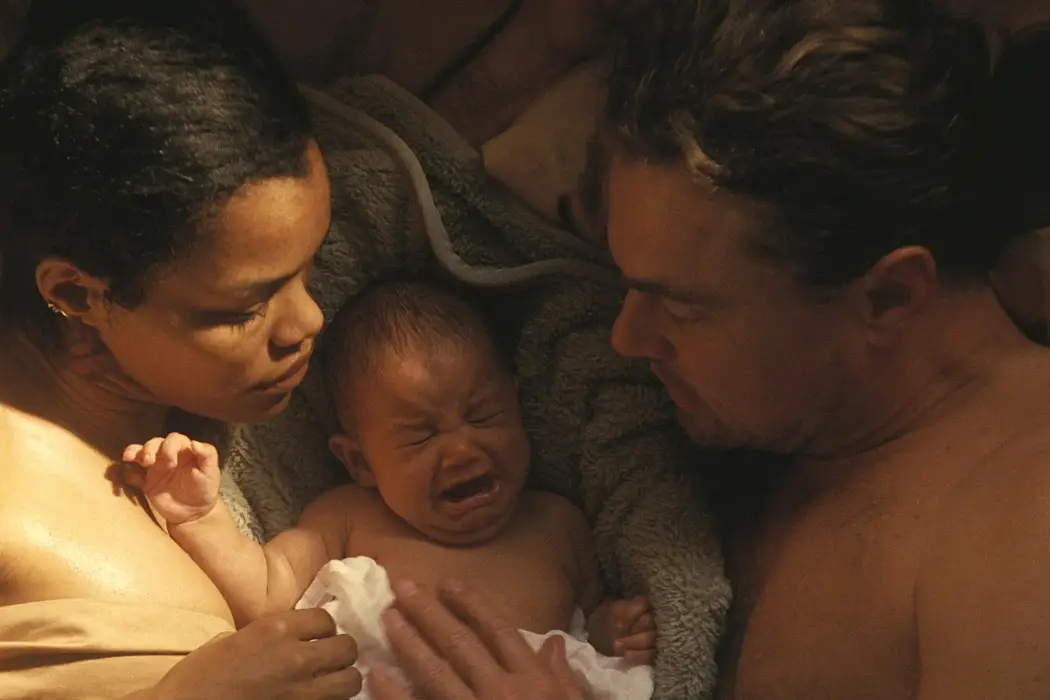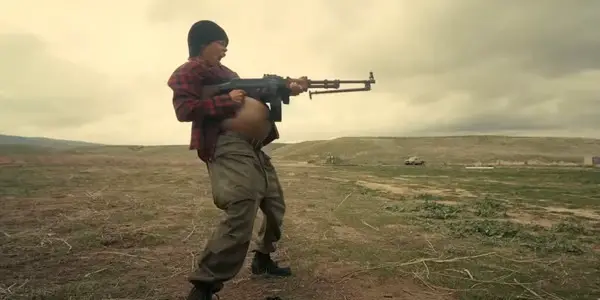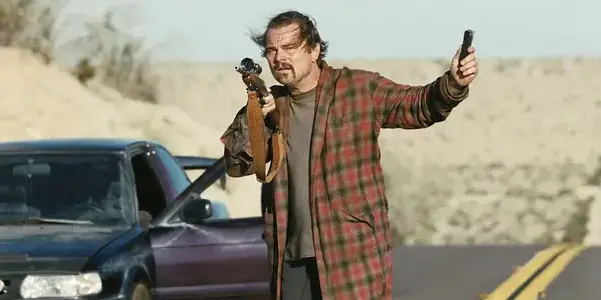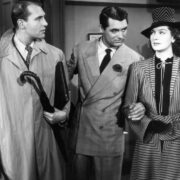ONE BATTLE AFTER ANOTHER Is the Movie of the Moment

Payton McCarty-Simas is a freelance writer and artist based in…
With Inherent Vice, one of his best films, Paul Thomas Anderson established himself as a brilliant channeler of the particular poetic disappointments of America’s countercultures. That adaptation of Thomas Pynchon’s seriocomic neo-noir by the same name takes the stoned sense of bleary, grim not-really-surprise–– at our nation’s corruption, its cynicism, its violence–– that crested in America as the free loving ‘60s became the hard knocking ‘70s and breathes fresh life into an era that often appears to us today as a velvet-painted psychedelic caricature. With One Battle After Another, a far looser adaptation of Vineland, Pynchon’s spiritual sequel to Inherent Vice, the director brings the fatalistic partisan wrath of the decades that followed screaming into the present. This monumental, year-best film, which also takes its political cues from Bryan Burrough’s brilliant history of countercultural militancy in the 1970s and early ‘80s, Days of Rage, is a riveting work of emotional delicacy, sly absurdist humor, and electrifying action.
It’s also a deeply felt, deeply needed clarion call to political attention. One Battle After Another urges viewers to shake off the apathy and/or nihilistic desperation that so often arrives on the heels of fizzling social movements and collapsed peaks of liberal optimism–– those same moods that so clearly define this country in 2025, haunting everything from the timidity of the Democratic party’s response to the current administration on the one hand to the inchoate, furious, internet-pilled politics that led to the assassination of Charlie Kirk and the rabidly censorious fallout thereafter on the other. While avoiding the kind of Twitter-brained rhetoric, cynical defeatism, and woebegone literalism of this year’s other topical neo-western-comedy-thriller about the Decline of Western Civilization, Eddington (Aster as the id to Anderson’s ego perhaps), this movie wants you to get up, pay attention, and, goddamnit, do something.

One Battle After Another presents us with an American fascist state. The nation, steered by a secret cabal of Santa-worshipping neo-Nazi demagogues and pockmarked by mass-deportation centers, is hewn by violence. Guerrilla groups exchange fire with ICE agents and Blow Up Pipelines while bounty hunters and crisis actors alike engage in vigilante injustice without recourse. When we begin, the French 75, an anticapitalist militia, is preparing to declare war on the government with the Foxy Brown-esque Perfidia Beverly Hills (an utterly captivating Teyana Taylor) at the helm. Only one soldier is late to the first battle: Ghetto Pat (Leonardo DiCaprio), their demolitions expert and Perfidia’s lover, who jogs over with a heaping wheelbarrow of munitions. “I’m with you, but I’m not too sure about the plan,” he soon confesses. This, we quickly learn, is Pat’s perennial state of being; always caught on the back foot, this white boy is earnest, passionate about the cause, and very clearly in way over his head.
The wild saga that unfurls like an upside-down American flag on a windy day is a microcosm for the pointless, selfish illogics that drive autocracies at all levels, landing somewhere between the politics of Z, Burn After Reading, and, somehow, Southland Tales. Perfidia’s erotic, impulsive, individualistic brand of revolution quickly catches the obsessive attention of one Colonel Lockjaw (Sean Penn), a wound-up mad dog army grunt with a thing for Black girls and a desperate desire to join the Christmas Adventurers Society, a cross between the Freemasons and the KKK with a strict aryan purity policy. Sixteen years after Perfidia trades sex for her freedom–– “the pussy ain’t for fun, it’s for war!”–– and splitting town in disgrace after a poignantly rendered lost battle with postpartum depression, the fallout really begins, not because the government still cares about the tattered, perennially blazed remains of the French 75, but because Lockjaw wants to keep his racial record lily white. Kafkaesque, the machine growls to life and the gears chew up anything and anyone that falls (or is pushed) into them.

This is where pathos begins to seep into what begins as a pure, brassy action satire. Each new twist, turn, shootout, and political thorn is nestled in humanistic, consistently hilarious storytelling that’s paired with satisfying directorial ease, visual economy, and a thrumming, infectious Johnny Greenwood score. Pat (now Bob courtesy of the underground network that’s helped him go into hiding) and his daughter Charlene (now Willa, dazzling newcomer Chase Infiniti) are living a quiet life in a sanctuary city in the Northern California woods. To Willa, Bob is a full-time burnout whose raging paranoia–– not to mention his love for The Battle of Algiers and Steely Dan–– she can’t really understand. When the army crashes her high school dance, though, his antiestablishment past begins to take on new, immediate, and dangerous meanings. Anderson and Pynchon’s social commentary thrives in this comedic lower key, too, as a befuddled Pat, a sort of anti-Lebowski figure for the Doppelgänger age, strains to remember revolutionary jargon sixteen years down the line, blurred by decades of substance abuse, slackerdom, and disappointment. It’s all blissfully topical without being obnoxious–– successfully landing a pronoun joke without sounding lame at best is no easy feat. During a Q&A in New York this week, the director observed that putting “big ideas” front and center can quickly make an audience lose interest. It’s gratifying in this late-stage A24/Elevated Horror era to see work from someone who remembers that stories qua stories can carry tremendous political freight without getting bogged down, losing their sense of humor, or being reduced to a series of mugging, meme-ing signposts.

This difficult hat trick comes down to both the subtlety of the film’s writing, a product of over thirty years of tinkering, and its philosophy, espoused both narratively and in its tone. The film delivers emotional and political contradictions with a bold cinematic simplicity– showstopping, crowd-pleasing set pieces like one especially mesmerizing car chase on Highway 78 do double duty as elegant visual metaphors for our uncertain but inevitable future (“time doesn’t exist yet it controls us anyway,” an armchair revolutionary intones to Bob over the phone). Amazingly for a movie this easy going, politically resonant and agile, One Battle After Another’s driving force, at the risk of sounding utterly trite, is love: A father’s for his daughter and communities’ for their members. As time wears on, Bob takes on a Job-like quality reminiscent of Larry Gopnick in the Coens‘ A Serious Man, never fully capable of fulfilling his duties to the revolution or his only child, seemingly fated to failure, a sensation eminently familiar in this period of gobsmackingly anti-democratic backlash to the social movements of the past long decade, from #MeToo to Black Lives Matter to the Gaza war protests today. Bob is buoyed, though by the support of the quieter members of the resistance, figures like Sensei Sergio (a career-best Benicio del Toro whose character was reportedly inspired by a painting of a tiger in a karate uniform), a lethally zen martial arts teacher with a “Latino Harriet Tubman thing going on” helping families evade la migra, and Deandra (Regina Hall), a former French 75er whose patience never ran out.
It’s these kinds of figures–– those who understand that someday Green Acres, Beverly Hillbillies, and Hooterville Junction will no longer be so goddamn relevant, who lead with heart and remind Bob that progress is measured in centuries, so play defense and don’t get selfish–– who actually hold movements together, not with rage, but with vision, purpose, and, yes, love. In this context, Bob may be a bad hombre, but he’s no hero. Yet, it becomes clear, he does have another kind of courage, mostly offscreen, evident in the years of tender, supportive solo parenting that allowed Willa to blossom into the burgeoning badass she is by the time her world cracks up. Without these endless wells of trust, affection, and fierce belief in the future, even if nurtured only for one’s child (born or chosen), true revolutionary action is impossible, the future bleak. Anderson’s latest reminds us that to help something–– yourself, your family, your country, or at the very least your vision of it–– you have to love it. From there, it’s just one battle after another.
Does content like this matter to you?
Become a Member and support film journalism. Unlock access to all of Film Inquiry`s great articles. Join a community of like-minded readers who are passionate about cinema - get access to our private members Network, give back to independent filmmakers, and more.
Payton McCarty-Simas is a freelance writer and artist based in New York City. They grew up in Massachusetts devouring Stephen King novels, Edgar Allan Poe stories, and Scooby Doo on VHS. Payton holds a masters degree in film and media studies from Columbia University and her work focuses on horror film, psychedelia, and the occult in particular. Their first book, One Step Short of Crazy: National Treasure and the Landscape of American Conspiracy Culture, is due for release in November.













